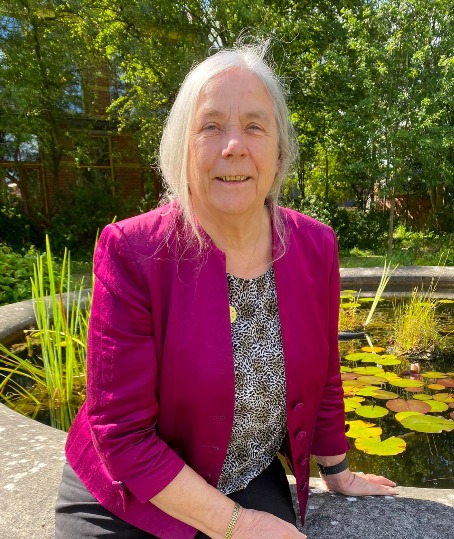Royal decoration for dedicated Professor and mentor

On Thursday 11 July 2024, José Heesink retired. She has shown a long-term and admirable commitment to the Psychology department at the Faculty of Behavioural and Social Sciences of the UG. During her farewell as Associate Professor and Chair Teaching Unit, she received a royal decoration from Koen Schuiling, Mayor of the Municipality of Groningen. Heesink has been appointed Knight of the Order of Orange-Nassau.
Driving force
After completing her Psychology degree in Groningen, José Heesink (Denekamp, 1957) went to Amsterdam, where she obtained her PhD at the VU Amsterdam in 1992. She had already returned to Groningen when she was appointed Assistant Professor and study advisor at the department of Social and Organizational Psychology of the UG in 1990. To both students, colleagues, and neighbours, she has been of great significance. Without her commitment and vision, the degree programme in Psychology would not have been what it is today. With her heartfelt concern for the interests of students, lecturers, and staff members, she has been the driving force behind innovation and improvement of the degree programme for many years. She especially committed herself to modernizing the curriculum and creating a contemporary learning environment. Moreover, throughout the Faculty she is known as a fantastic role model and someone who goes above and beyond the call of duty: she approaches tasks not as ‘what must be done’, but rather as ‘what can be done’.
Initiator
Heesink was the founder of the Academic Development & Skills unit: a noteworthy accomplishment. This unit has earned a permanent place in the teaching programme. With her background in conversational skills, mediation, and coaching, she knew all too well how essential it is for students to master academic, professional, and research skills during their degree programme. The unit is aimed at training students these skills so they can reach their full potential and are well prepared for their future careers. Together with her colleagues, Heesink has also committed herself to increase student success by setting up learning communities. Learning together, and supporting, and inspiring each other positively influence the development of students, strengthens their knowledge, and helps prevent premature drop-out and stress. It has become clear that these communities are invaluable to both student and lecturers.
Renewed appreciation of teaching duties
Heesink’s accomplishments in the field of teaching prove how much she was ahead of her time. She was an advocate of the renewed appreciation for teaching duties, long before the need to reconsider the appreciation for teaching and research became an important, national reality. In this way, she made sure that all lecturers, whether or not with a fixed appointment, were able to further develop themselves. Thanks to her efforts, temporary lecturers were also able to obtain their University Teaching Qualification. Since then, many other universities followed in her footsteps.
Coaching Platform
Another example of her boundless efforts is the creation of the Coaching Platform in 2011, where students can have conversations with a coach who is trained at the Psychology department. This way, students who have finished the Master’s course in Coaching can apply their coaching skills in practice. Heesink actively facilitated peer support and supervision for the coaches involved. Since then, almost 200 coaches have been able to gain experience through this platform and even many more students have profited from the conversations, which allowed them to make better choices, experience less stress, and improve their study results. With this extra activity, the department of Psychology has created something very special.
Mentor, leader, role model
Heesink enjoys an excellent reputation in her Faculty. In fact, almost everyone knows her and she has built a strong trust-based relationship t with many. She is known as a mentor, leader, role model, and pragmatist and mostly as someone who will always be there to support and supervise others. When she notices that someone gets stuck, she acts immediately and is very skilled in finding the right people who can offer support or solve problems. At her own initiative, she adopted the role of confidential advisor for PhD students, even before this position officially existed. In addition, she was one of the founding members of peer discussion groups for female academics. She ensured a suitable group composition, taking into account a good match between the group members with respect to career questions and personality. Thanks to this peer support, several women have been able to take the next step in their academic career.
Facade gardens and street parties
Heesink did not limit her activities to just her work. On the contrary, she was also very active in her own neighbourhood: the Schildersbuurt in Groningen. She set up the working group StudentBuren [Student Neighbours] to improve the relationship between permanent and temporary residents and she organized street parties and baking competitions. She also dedicated herself with much enthusiasm to preserve the character of the neighbourhood, the quality of life, and green spaces, which resulted in a bike scheme, cleaning days, facade gardens, and tree pits.
| Last modified: | 15 July 2024 09.24 a.m. |
More news
-
17 December 2024
Autism in women: masking takes its toll
Women with autism are often diagnosed later than men. Researcher Yvonne Groen developed a screening tool together with her colleagues to simplify the diagnosis.
-
26 November 2024
The fear of eating
Renate Neimeijer conducts research into eating disorders among children and young adults. Her current research focuses on ARFID: avoidant/restrictive food intake disorder.
-
05 November 2024
Do parents have any influence on whether their children wear 'pink' or 'grey' glasses?
How does a positive outlook actually develop? How important is upbringing in this regard? And what kind of role does optimism actually play in the daily lives of parents and children? Charlotte Vrijen is trying to find an answer to these questions....
